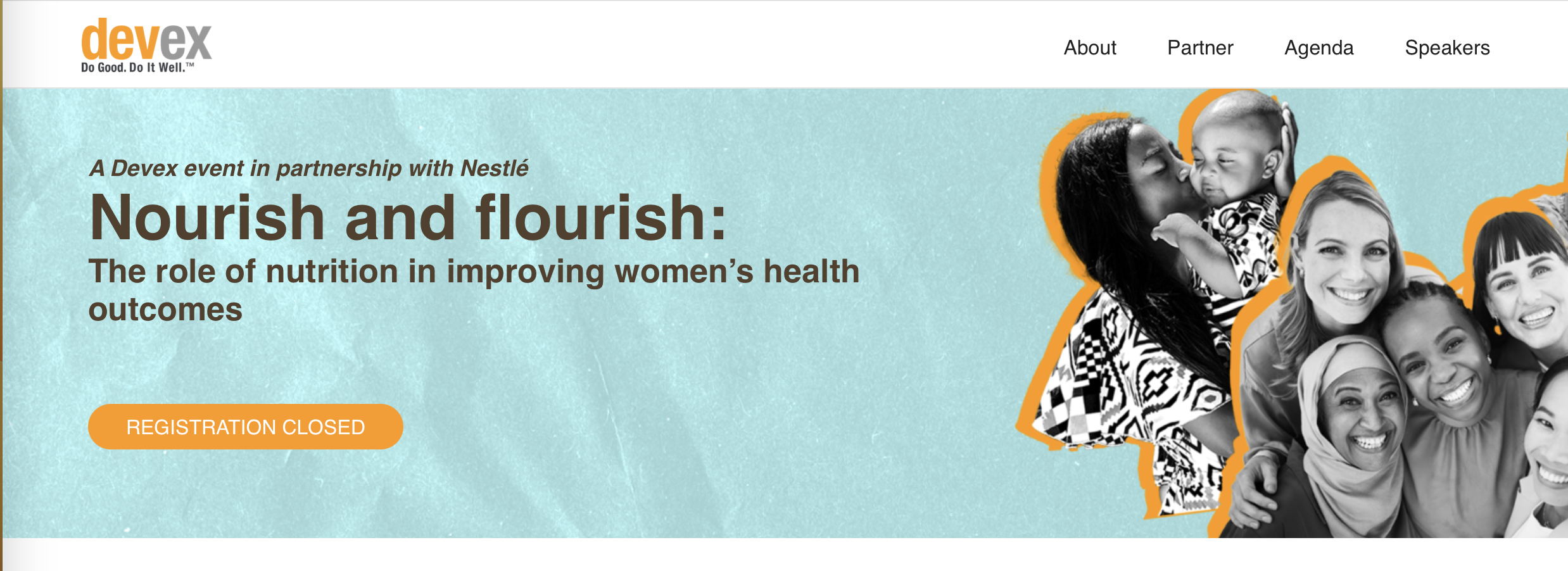Devex ends partnership with Nestle following alarm by NGOs and global health experts

The saga has exposed how corporate partnerships blur the line between information and advertising and independent editorials. Devex originally stated that: “This virtual event, hosted by Devex in partnership with Nestlé, will bring together nutrition and women’s health experts to jointly explore what’s needed to support women’s health and well-being through good nutrition across all life stages’ In her response the IFE, Kate Warren, Devex Executive Vice President & Executive Editor, described it as part of an advertising partnership with Nestlé, saying that “Devex is an independent news organization and we highly value our credibility and independence… We want to make it clear that advertising does not in any way influence our editorial decisions and accepting advertising does not imply an endorsement of any organization or product. We follow the same advertising practices of the most highly-regarded major news organizations.”
The event would have coincided with Nestlé ‘s launch of their Materna product line of expensive supplements and vitamins aimed at pregnant and postpartum people in North America, Latin America, and Asia. (Nestle to expand its maternal health offering to support motherhood). While the products are not the formulas for mothers that are so often co-branded with infant formulas, the promotional material subtly undermines women’s confidence in breastfeeding and minimally processed family foods and uses unsubstantiated claims: “Materna OPTI-LAC is a supplement that helps breastfeeding mothers reduce breast pain caused by bacterial mastitis, which is one of the leading reasons why mothers stop breastfeeding early.”
(1) The letter was sent on behalf of the World Breastfeeding Trends Initiative (WBTI), IBFAN, the Baby Feeding Law Group, global health academics and the Infant Feeding in Emergencies Core Group. The IFE is a global collaboration of agencies and individuals that formed in 1999 to address policy guidance and training resource gaps hampering programming on infant and young child feeding support in emergencies.
(2) WEF: Closing the Women’s Health Gap Insight Report 2024 (pdf, 2Mb)
Devex
A Devex event in partnership with Nestlé
Nourish and flourish:
The role of nutrition in improving women’s health outcomes
REGISTRATION CLOSED
About the Event
This virtual event, hosted by Devex in partnership with Nestlé, will bring together nutrition and women’s health experts to jointly explore what’s needed to support women’s health and well-being through good nutrition across all life stages. The discussion will also highlight the importance of considering gender-specific research and programs in order to advance women’s health outcomes and maximize the impact of nutrition interventions and policies.
Millions of women and adolescent girls across the globe struggle to access nutritious diets and essential nutrition services, exacerbating gender inequalities. Good nutrition is vital for women’s health before and during pregnancy or breastfeeding, and to raise well-nourished children. Without proper nutrition, women and adolescent girls risk weakening their immunity to infections.
Globally, more than 1 billion adolescent girls and women suffer from undernutrition, micronutrient deficiencies, and anemia, endangering our communities. The gender gap in food insecurity more than doubled from 49 million in 2019 to 126 million in 2021, with COVID-19 exacerbating the situation. Progress towards the 2030 Sustainable Development Goals has been minimal and anemia and micronutrient deficiencies remain prevalent.
Don’t miss this opportunity to hear from leading experts on the role of nutrition in transforming women’s health. Register now to join us!
